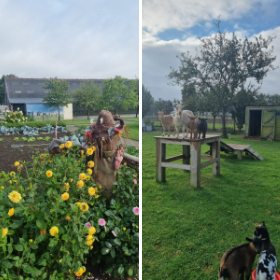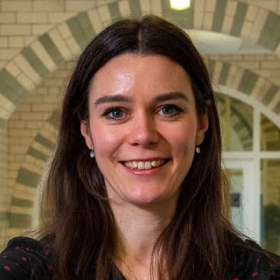This week I’ve been fortunate enough to hold my long-awaited final research visit to Maastricht University and their Living Lab, thanks to an Alzheimer’s Society and Alzheimer’s Nederland Knowledge Exchange Fellowship. This final trip has been long delayed due to the pandemic, so it’s been extra special to walk across those cobbled stones in Maastricht again and finally meet old friends and collaborators again in person, not from behind a screen.
Our project focused on inequalities in post-diagnostic dementia care in England and the Netherlands, having used a mixed-methods approach to understand the barriers that people living with dementia, and their carers, experience when trying to access care. We reported on many barriers that were similar across both countries, but also one key facilitator well integrated in the Netherlands – Dementia Care Navigators. This final visit offered the opportunity to discuss these findings at a University Colloquium and explore how we can tackle these inequalities.
Whilst that was the focus of the project, a key element of this Knowledge Exchange Fellowship was to learn about the Dutch care settings and funding systems. Over a number of visits, and on a prior ERASMUS Staff exchange (oh ERASMUS, just where have you gone for UK students and staff…), I’ve visited different care homes, eaten cake before noon, and learned about how staff is much more valued in the Netherlands, and how care staff actually purposefully seeks out their job. I also learned about more innovative long-term care designs, such as small home-like environments and what I would consider the best possible option of care – Green Care Farms. That is not because of the baby goats I spotted and admired and wanted to put in my handbag to fly back home with me. Not only at least.

Green care farms provide a specific type of small-scale, homelike care environment for people with dementia as an alternative to traditional nursing home care. There are over 1,000 of these in the Netherlands, 250 of those are dementia care specific.
Green Care Farms, such as de Port, are one type of innovative long-term care. The whole care ethos is structured around enabling activity, meaningful activity, and as much independence and engagement with the outdoors as possible. Most of Green Care Farm residents have a background in farming or lived next to a farm or enjoyed hobby gardening throughout their life. Seeing the enormous cabbages and other vegetables only slightly raised my hobby vegetable gardener envy, but made me all the more appreciate how much the garden, and animals, are part of their every day life. Care comes as an afterthought here, at least that what it feels like. Not in a bad way though. No, life on a Green Care Farm seems to be more about living in a very cosy homelike place, with care provided as well if you need it. It is not the constant focus though.
In fact, research by one collaborator has focused on just how innovative, and impactful, Green Care Farms are. Compared to traditional nursing homes, Green Care Farms provide higher levels of activity, greater outdoor engagement and social interactions for people living with dementia. Watching the residents there today, it is refreshing to see them so liberated and not stuck to a chair. Residents talk a walk in the garden at their own leisure, feed the chicken, admire the vegetables, and are involved in all outdoor activities. What’s more, day care centre attendees join in. And what seemed to be an additional benefit, but maybe underpinning factor, was the ease with which staff engaged with residents.
Now, I have only seen one Green Care Farm, but Bram’s research paints a much broader picture. Seeing and learning about these different forms of care settings in one country is really important to bring this knowledge over here – in the true spirit of the ‘Knowledge Exchange’. Unfortunately, Green Care Farms are likely going to take a while to hit off in the UK I think, but let’s start now and not waste any more time to improve care where possible.
All in all, it’s been a fantastic project to work on and visits to learn from. This certainly won’t be the last, but one of many Liverpool-Maastricht collaborations. If you want to find out more about Green Care Farms from one of the owners themselves, have a listen to my science podcast The Ageing Scientist, sadly no goats mentioned though.

Dr Clarissa Giebel
Author
Dr Clarissa Giebel is a Senior Research Fellow at the University of Liverpool and NIHR ARC North West Coast. Clarissa has been working in dementia care research for over 10 years focusing her research on helping people with dementia to live at home independently and well for longer, addressing inequalities that people with dementia and carers can face. Outside of her day work, Clarissa has also organised a local dementia network – the Liverpool Dementia & Ageing Research Forum, and has recently started her own podcast called the Ageing Scientist.

 Print This Post
Print This Post





